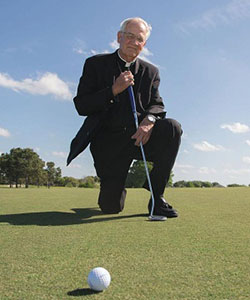

|
| Musical Musings: Liturgy |
|
|
Liturgy at the Masters:What liturgists might learn from the Masters golf tournamentThis article is reprinted from the April 9, 2018, edition of CatholicCulture.org, with the kind permission of the author.
Writing for First Things, Brandon McGinley comments on that "tradition unlike any other," and the tight control that the hosts of the tournament exert in order to preserve its dignity. There are rules at Augusta National; lots of rules. And they are enforced. Anyone whose behavior threatens the reverential atmosphere is quickly reprimanded. Television broadcasts are carefully scripted, and sardonic commentators are banished. If you want you can poke fun at the hidebound leaders of the Augusta National club; you can call their approach anachronistic. But you can't deny that people take the Masters more seriously than other golf tournaments. There is a clear sense that something important is happening: something that transcends the usual work of the professional golf tour. McGinley remarks that the Catholic Church might have preserved the same sort of unique legacy, the same reverence for what the Church is and does. "But instead," he observes ruefully, "the Church is too often just another smoothed-over institution on the terrain of modern liberalism." He is not writing particularly about the liturgy, although that is certainly an important part of the picture. In fact he devotes more attention to Catholic educational institutions, with a special focus on Notre Dame. "We don't act as though the Church had something special to offer," McGinley argues; "and so, with rare exceptions when her irrepressible transcendence bursts forth, no one treats her as though she did." McGinley's commentary on the Masters reminded me of a comment that I posted a few years ago, making a similar point — but in this case concentrating on the liturgy:
A friend of mine is a priest in the Diocese of Arlington, Virginia.
Over the years he has often conducted burial services at Arlington National Cemetery.
There is a prescribed ritual for burials there.
My friend reports that no one ever suggested any variation from that service.
It is simple, solemn, reverent.
Those who attend the service understand, without needing to be told, that they are expected to follow the protocol, to conduct themselves in a way that is suitable to the occasion.
Copyright © 2018 by Trinity Communications
All rights reserved.
Article written 09 April 2018 |
Submit Your Music / Contact Us / Company Description / Links
 Although I am neither a golfer nor a golf fan, I enjoy watching the Masters on television each year, for several reasons.
The Augusta National course is an unusually beautiful one.
The azaleas and rhododendrons, in full bloom in Georgia, provide pleasant reassurance that spring will eventually arrive here in New England as well.
The competition is usually taut. Above all, the tournament is surrounded by a tradition richer than the scenery.
Although I am neither a golfer nor a golf fan, I enjoy watching the Masters on television each year, for several reasons.
The Augusta National course is an unusually beautiful one.
The azaleas and rhododendrons, in full bloom in Georgia, provide pleasant reassurance that spring will eventually arrive here in New England as well.
The competition is usually taut. Above all, the tournament is surrounded by a tradition richer than the scenery.